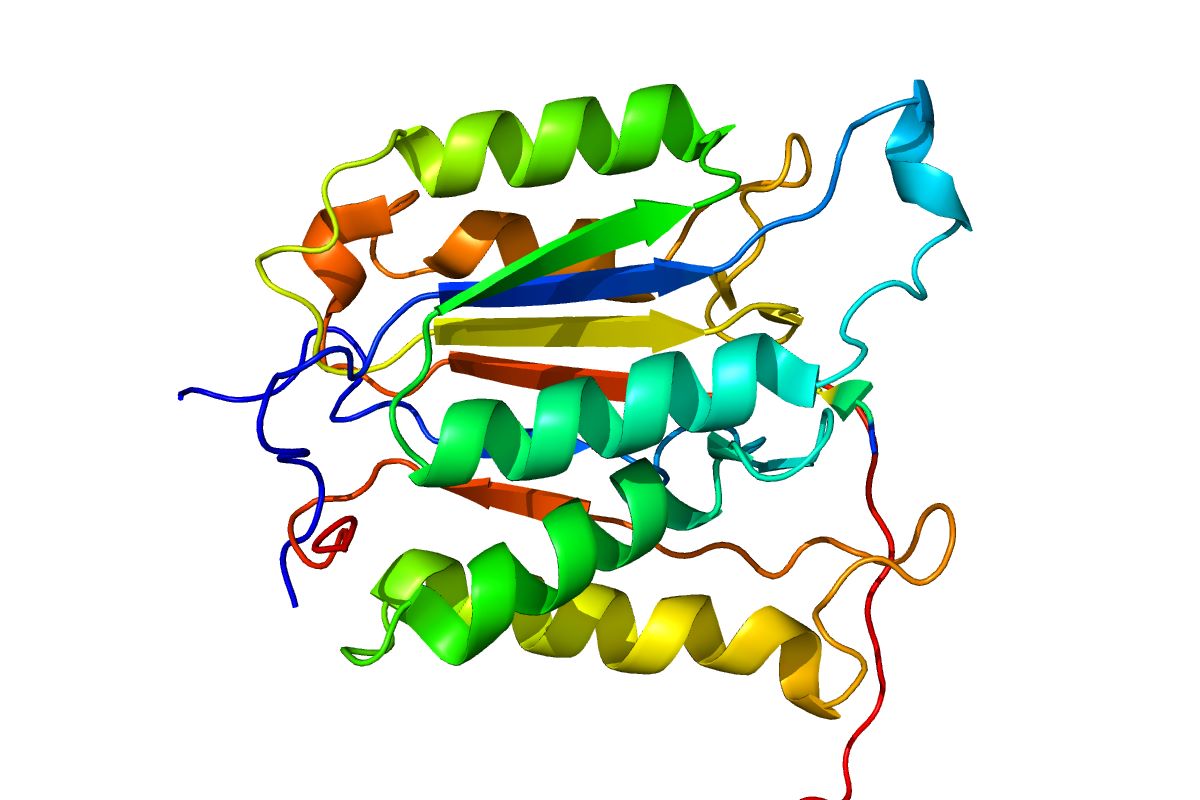
Caspases are a group of enzymes playing a crucial role in programmed cell death, also known as apoptosis. These proteins ensure cells die in a controlled manner, preventing damage to surrounding tissues. Caspases are essential for maintaining healthy tissue function and development. Without them, cells could grow uncontrollably, leading to diseases like cancer. Understanding caspases helps researchers develop treatments for various conditions, including neurodegenerative disorders and autoimmune diseases. This article dives into 40 intriguing facts about caspases, shedding light on their functions, mechanisms, and significance in human health. Get ready to explore the fascinating world of these vital enzymes!
Key Takeaways:
- Caspases are important enzymes that control cell death and survival, impacting diseases like cancer and neurodegenerative disorders. They also play a role in tissue development and immune system regulation.
- Understanding caspase activation mechanisms and inhibitors can lead to potential therapies for cancer, neurodegenerative diseases, and inflammatory conditions. Research on caspases has shown promising developments in these areas.
What are Caspases?
Caspases are a family of enzymes playing a crucial role in programmed cell death, or apoptosis. They are essential for maintaining the balance between cell death and survival, ensuring proper development and health.
- Caspases are cysteine-aspartic proteases, meaning they cleave proteins at specific aspartic acid residues.
- There are 14 known caspases in humans, each with unique functions and activation mechanisms.
- Caspases are synthesized as inactive precursors called procaspases, which require cleavage for activation.
- They are divided into two main groups: initiator caspases (like caspase-8 and caspase-9) and effector caspases (like caspase-3 and caspase-7).
- Initiator caspases activate effector caspases, which then execute the cell death program by cleaving various cellular substrates.
Functions of Caspases
Caspases are not only involved in apoptosis but also play roles in inflammation and other cellular processes. Understanding their functions can help in developing therapies for diseases.
- Caspase-1, also known as interleukin-1β-converting enzyme (ICE), is involved in the inflammatory response by processing pro-inflammatory cytokines.
- Caspase-3 is often referred to as the "executioner" caspase due to its central role in the execution phase of apoptosis.
- Caspase-8 is crucial for the extrinsic pathway of apoptosis, which is triggered by death receptors on the cell surface.
- Caspase-9 is essential for the intrinsic pathway of apoptosis, which is initiated by internal cellular stress signals.
- Some caspases, like caspase-12, are involved in the cellular response to endoplasmic reticulum stress.
Caspases in Disease
Dysregulation of caspase activity can lead to various diseases, including cancer, neurodegenerative disorders, and autoimmune diseases. Here are some examples of how caspases are implicated in different conditions.
- Overactive caspase-3 has been linked to excessive cell death in neurodegenerative diseases like Alzheimer's and Parkinson's.
- Reduced caspase activity can contribute to cancer by allowing damaged cells to survive and proliferate.
- Caspase-1 is implicated in inflammatory diseases such as rheumatoid arthritis and Crohn's disease.
- Mutations in caspase-8 can lead to immune system disorders, as it plays a role in lymphocyte activation and proliferation.
- Caspase-9 mutations are associated with certain types of cancer, including melanoma and non-Hodgkin lymphoma.
Caspase Activation Mechanisms
Caspases are tightly regulated and activated through specific mechanisms to ensure they only function when needed. Understanding these mechanisms is key to manipulating caspase activity for therapeutic purposes.
- The extrinsic pathway of apoptosis involves the binding of death ligands to death receptors, leading to the activation of caspase-8.
- The intrinsic pathway is triggered by mitochondrial release of cytochrome c, which forms a complex with Apaf-1 and caspase-9, known as the apoptosome.
- Caspase-1 is activated by inflammasomes, which are multi-protein complexes formed in response to pathogenic infections or cellular stress.
- Some caspases require dimerization for activation, while others need cleavage by upstream caspases.
- Inhibitors of apoptosis proteins (IAPs) can bind to and inhibit caspases, preventing unwanted cell death.
Research and Therapeutic Potential
Research on caspases has led to potential therapeutic applications, particularly in cancer treatment and neuroprotection. Here are some exciting developments in this field.
- Caspase inhibitors are being explored as treatments for neurodegenerative diseases to prevent excessive neuronal death.
- Activating caspases in cancer cells can induce apoptosis, making them a target for cancer therapies.
- Caspase-3 inhibitors are being studied for their potential to reduce tissue damage during heart attacks and strokes.
- Gene therapy approaches aim to deliver caspase genes to cancer cells, triggering their self-destruction.
- Small molecules that modulate caspase activity are being developed to treat inflammatory diseases.
Interesting Facts about Caspases
Caspases have some fascinating characteristics and roles beyond their well-known functions. Here are a few intriguing facts about these enzymes.
- Caspases are evolutionarily conserved, meaning they are found in a wide range of organisms from humans to simple organisms like nematodes.
- The name "caspase" is derived from "cysteine-aspartic protease," highlighting their specific cleavage activity.
- Caspases can be involved in non-apoptotic processes, such as cell differentiation and proliferation.
- Some viruses encode caspase inhibitors to prevent the host cell from undergoing apoptosis, allowing the virus to replicate.
- Caspase activity can be detected using specific fluorescent substrates, which are valuable tools in research.
Caspases in Development
Caspases play crucial roles in the development of organisms, ensuring proper tissue formation and removal of unnecessary cells. Here are some examples of their involvement in developmental processes.
- During embryonic development, caspases help sculpt tissues by removing excess cells through apoptosis.
- Caspase-3 is involved in the differentiation of certain cell types, such as neurons and muscle cells.
- In the immune system, caspases regulate the development and maturation of immune cells.
- Caspase-9 is essential for brain development, as it helps eliminate improperly connected neurons.
- Caspases also play a role in the formation of the heart by removing cells that are no longer needed.
Caspase Inhibitors
Caspase inhibitors are molecules that can block the activity of caspases, offering potential therapeutic benefits. Here are some interesting facts about these inhibitors.
- Natural caspase inhibitors, such as XIAP, are found within cells and help regulate apoptosis.
- Synthetic caspase inhibitors are being developed to treat diseases characterized by excessive cell death, like neurodegenerative disorders.
- Some caspase inhibitors are derived from natural sources, such as plants and microorganisms.
- Caspase inhibitors can be used in research to study the role of specific caspases in various cellular processes.
- The development of selective caspase inhibitors is challenging due to the structural similarities among different caspases.
Final Thoughts on Caspases
Caspases play a crucial role in cell death and inflammation. These enzymes, acting as molecular scissors, ensure damaged or unnecessary cells are removed efficiently. Understanding caspases can help in developing treatments for diseases like cancer, Alzheimer's, and autoimmune disorders. Researchers continue to explore how manipulating caspase activity might offer new therapeutic avenues.
Knowing these facts about caspases highlights their importance in maintaining cellular health. This knowledge can lead to better medical advancements and improved health outcomes. So, next time you hear about cell death or inflammation, remember the vital role caspases play behind the scenes.
Stay curious and keep learning about the microscopic processes that keep our bodies functioning smoothly. Caspases might be tiny, but their impact is enormous.
Frequently Asked Questions
Was this page helpful?
Our commitment to delivering trustworthy and engaging content is at the heart of what we do. Each fact on our site is contributed by real users like you, bringing a wealth of diverse insights and information. To ensure the highest standards of accuracy and reliability, our dedicated editors meticulously review each submission. This process guarantees that the facts we share are not only fascinating but also credible. Trust in our commitment to quality and authenticity as you explore and learn with us.


